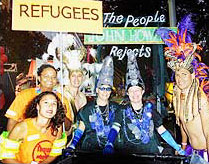Sydney?s gay and lesbian community gave race, religion and politics centre stage on Saturday night as the city celebrated its 25th Mardi Gras.

Protesting Australia's decision in refusing to allow Norwegian freighter to offload the boatpeople it rescued
The spectacular annual event, which began as a civil rights march in 1978 continues to carry strong political messages.
The lead float featuring a large replica of St. Mary?s Cathedral accompanied by a cast of angels, devils, and cardinals, took centre stage right after the "dykes on bikes" motorcycle cavalcade.
The float, which includes an effigy of Archbishop George Pell, known for his anti-gay comments challenged the church?s stance on homosexuality as well as the narrow-minded attitudes of institutions that continue to persecute gay men and lesbians.
Another float, HMAS Tampaphobia lampooned Australian Prime Minister John Howard's handling of the boat people crisis. Last year, Australia refused to allow the Norwegian freighter Tampa to offload 433 boatpeople it had rescued.
Masked lookalikes of Prime Minister Howard and Immigration Minister Philip Ruddock pretended to throw children from the vehicle - ridiculing the 'children overboard' affair which continues to dog the Aussie PM although it was proven false while marchers handed out Australian ?visas? to the crowd.
"Mardi Gras is ...an occasion when we can empathize with other people whose place in the world is jeopardized by their difference whether that be racial, religious or political," said Tampaphobia spokesperson Gina Laurie in an CNN report.
In recent years, the Mardi Gras has in recent years attracted criticism that it has deviated from its origins as a protest march.
"There's a whole generation of people to whom Mardi Gras now is about a month of fun, a month of celebration, a month of dance parties, drugs, excesses and the high life," said Christopher Puplick, president of the Anti-Discrimination Board of New South Wales.
"And the people for whom the political agenda is still important don't see Mardi Gras as a particularly significant vehicle," he told Reuters.
Aids Council NSW CEO Stevie Clayton, however, saw it differently.
"Gay men and lesbians still do not have equality and still experience appallingly high rates of discrimination and violence.
"For many, Mardi Gras is still the one night of the year that they can feel safe in the streets and feel like it is okay for them to take up space and be themselves," she said.











 列印版本
列印版本










讀者回應
搶先發表第一個回應吧!
請先登入再使用此功能。